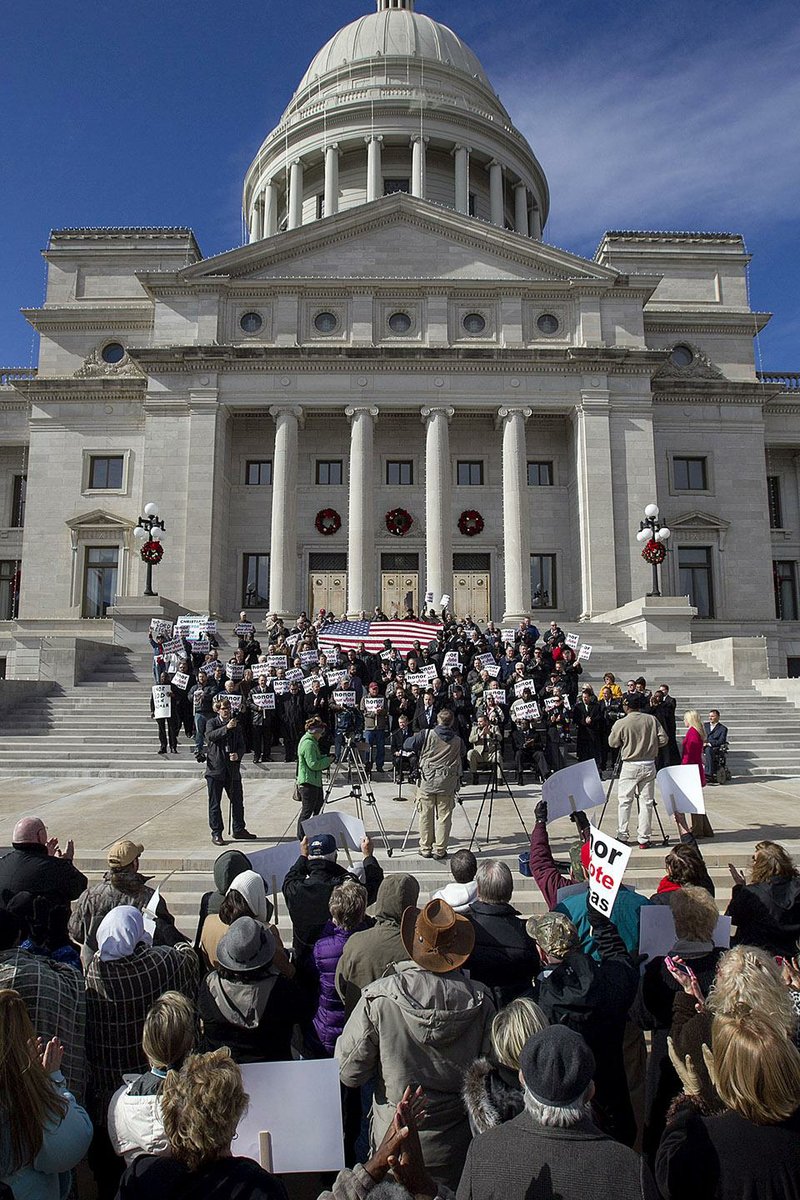Judges in two different courts will hear arguments over the fate of the state's ban on gay marriage today.
The Arkansas Supreme Court at 9 a.m. will hear oral arguments in an appeal of a May ruling by Pulaski County Circuit Judge Chris Piazza that invalidated the state's anti-same-sex-marriage laws.
At 1:30 p.m., U.S. District Judge Kristine Baker will hear arguments from state attorneys, as well as those representing same- sex couples in Arkansas, on whether to side with critics of the law and grant a summary judgment and toss the state prohibitions, or to side with state attorneys who argue that the suit should be dismissed.
On Wednesday, more than 100 supporters of the traditional state definition of marriage gathered at the steps of the state Capitol to pray and urge the justices on the state's highest court to respect a constitutional amendment that was overwhelmingly approved by voters 10 years ago.
Jerry Cox, head of the Family Council, said Piazza overstepped his bounds as an interpreter of law and "obliterated" the definition of marriage in his May ruling, which was stayed pending appeal before the Supreme Court.
"Why did we vote if our vote doesn't count?" Cox asked the crowd. "The Supreme Court has an opportunity this week to let the people of Arkansas know that their vote does count."
A small cadre of gay-marriage supporters made their presence known during the event, waving rainbow-colored flags, placards, and occasionally shouting at the event's keynote speakers.
Amy Spears, 23, said she came out as a counter-demonstrator to show her support for gay friends and family members who don't enjoy the same opportunity to marry as she does as a straight woman.
"[This argument is] on the wrong side of government. There should be a separation of church and state," she said. "The majority can't govern the minority and religious views can't govern the law."
Opponents of the law, who first filed suit in Piazza's court, argue that current state law forbidding same-sex couples marriages violates the due process clause of the 14th Amendment of the U.S. Constitution, as well as rights to privacy and equal protection. They also maintain that the law violates key provisions in the state constitution.
Leaning on the 2013 U.S. Supreme Court ruling -- United States v. Windsor -- that stripped the section of the nation's Defense of Marriage Act that defined marriage as only between a man and a woman because it "violated basic due process and equal protection principles," those attorneys argue that states too should recognize how such laws violate the rights of same-sex couples.
State attorneys argue that critics of the law misread the 2013 Supreme Court ruling, saying that the high court deferred regulating marriage to states and "specifically declined to recognize same-sex marriage as a fundamental right" protected by the U.S. Constitution. State attorneys also emphasize that sexual orientation does not qualify as a "suspect class" entitled to equal protection status.
They further argued that the marriage ban, codified in Amendment 83, cannot be unconstitutional because it is itself included in the Arkansas Constitution.
In the federal case, state attorneys are asking that the court to dismiss under the doctrine of "abstention," meaning that since a similar case is already being considered in state courts, that the federal authority should bow out.
Opponents of gay-marriage bans argue against such a dismissal because their clients, and other same sex couples, will continue to be deprived of their rights until action by the court.
Since the Windsor decision, several state and federal courts have ruled in favor of same-sex marriage. There are currently 33 states where same-sex marriage is legal.
University of Arkansas at Little Rock law school professor Josh Silverstein said the issues in both courts today will be argued similarly, and said there are any number of scenarios that could play out.
"I would not bet money, to be sure, but here is what we do know: the vast majority of federal and state courts that have considered the same sex marriage bans since the Windsor decision have found those bans to be unconstitutional," Silverstein said. "Given the number of courts that have ruled, there is reason to believe [local courts] will go the same way. But it's not a guarantee."
Metro on 11/20/2014

